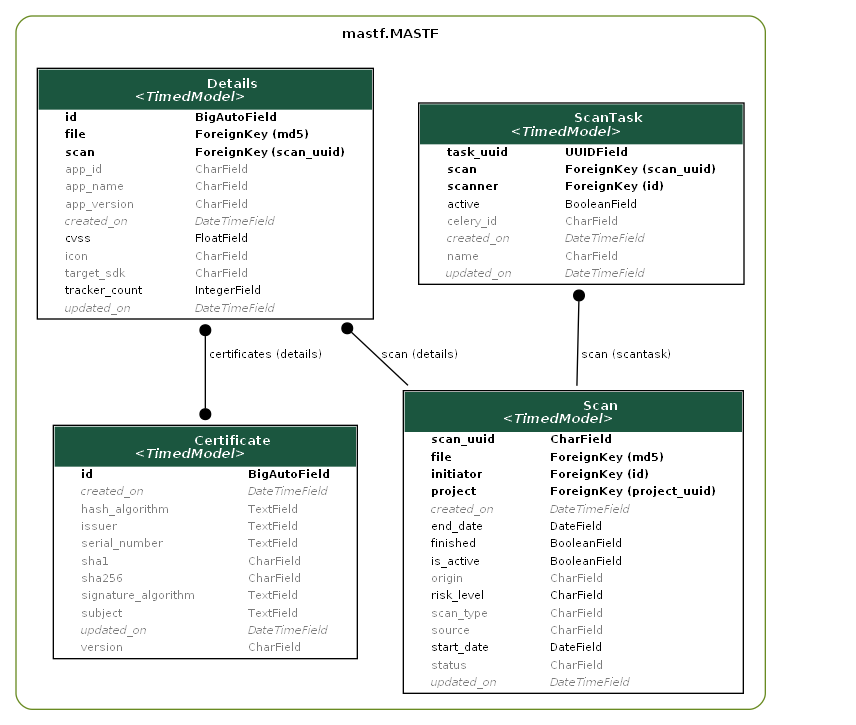Scan Models
In this document, we will discuss two Django models, Scan and
ScanTask. These models represent a scanning system that scans
for vulnerabilities in mobile applications. The Scan model represents
a single scan, and the ScanTask model represents a task within that
scan. We will provide an overview of the models and explain their fields and
methods in detail.

Figure 1: Overview of models that are related to Scan objects and
will be covered on this page.
- class mastf.MASTF.models.Scan(*args, **kwargs)[source]
Describes a static app scan.
- end_date
Stores the ent datetime of the scan
- file
Stores a relation to the file to scan.
- static files(project: Project = None, initiator: User = None, team: Team = None) list[source]
Returns a list of files that have been saved by a given user or within the provided project.
- Parameters:
project (Project, optional) – the project, defaults to None
initiator (User, optional) – the initiator of target scans, defaults to None
- Returns:
a list of uploaded files
- Return type:
list
- finished
Property to determine whether this scan has finished.
- initiator
Stores the user that has started the scan
- is_active
Simple property used to indicate whether the scan is stil busy.
- static last_scan(project: Project = None, initiator: User = None)[source]
Returns the last scan that was started by the provided user or within the given project.
- origin
Stores the scan origin of the scan. The origin can point to the following values:
Play-Store
iOS-App-Store
APKPure
File
…
- project
The project of this scan
- risk_level
Stores the classification (LOW, MEDIUM, HIGH)
- scan_type
Stores the name of the scan type
- scan_uuid
Stores the identifier for this scan.
- source
Stores the file source.
The source of an uploaded file can be one of the following: - URL: An URL was given from where the file was downloaded - File: Simple file upload
- start_date
Stores the start time of this scan
- status
Stores information about the current scan’s status
- class mastf.MASTF.models.ScanTask(*args, **kwargs)[source]
Represents a task for internal scans.
Note
This model is introduced to enable multiple web instances being able to handle task-specific requests.
- static active_tasks(scan: Scan = None, project: Project = None) list[source]
A static method that returns a list of active
ScanTaskobjects.It takes two optional parameters: scan and project. If scan is provided, it returns a list of active ScanTask objects associated with that
Scanobject. If project is provided, it returns a list of active ScanTask objects associated withScanobjects that belong to thatProjectobject. If neither parameter is provided, an empty list is returned.
- celery_id
The assigned celery id (may be null on creation).
- static finish_scan(scan: Scan, task: ScanTask) None[source]
This method is used to finish a scan by setting the
is_activeattribute of the corresponding Scan object to False when all related ScanTask objects have completed.
- name
The task’s name (primarily used in HTML representation)
- scan
A foreign key to the
Scanmodel, with theCASCADEoption to ensure that when aScanobject is deleted, all relatedScanTaskobjects are also deleted.
- scanner
A foreign key to the
Scannermodel, with theCASCADEoption and able to allow null values.
- task_uuid
The UUID field with a maximum length of 32 characters is set as the primary key of the model.
- class mastf.MASTF.models.Certificate(*args, **kwargs)[source]
Represents an identified certificate.
The
Detailsis designed to store multiple certificate instances as each app may contain more than one certificates. We don’t specify the scan reference directly as it will be created in a many-to-many relationship.- Variables:
details – A list of
Detailsobjects this certificate was found in
- hash_algorithm
Describes the used hashing algorithm
- issuer
Human readable certificate issuer.
- serial_number
If present, the serial number will be stored in a
TextField.
- sha1
The sha1 fingerprint
- sha256
The sha256 fingerprint
- signature_algorithm
The used signature algorithm.
- subject
Human readable subject.
- version
Indicates whether the APK is signed using APK signature scheme version X.
Note that version values are stored in the format
vXwhereXrepresents the version number. In addition, a higher version number declares lower signature schemes impicitly.